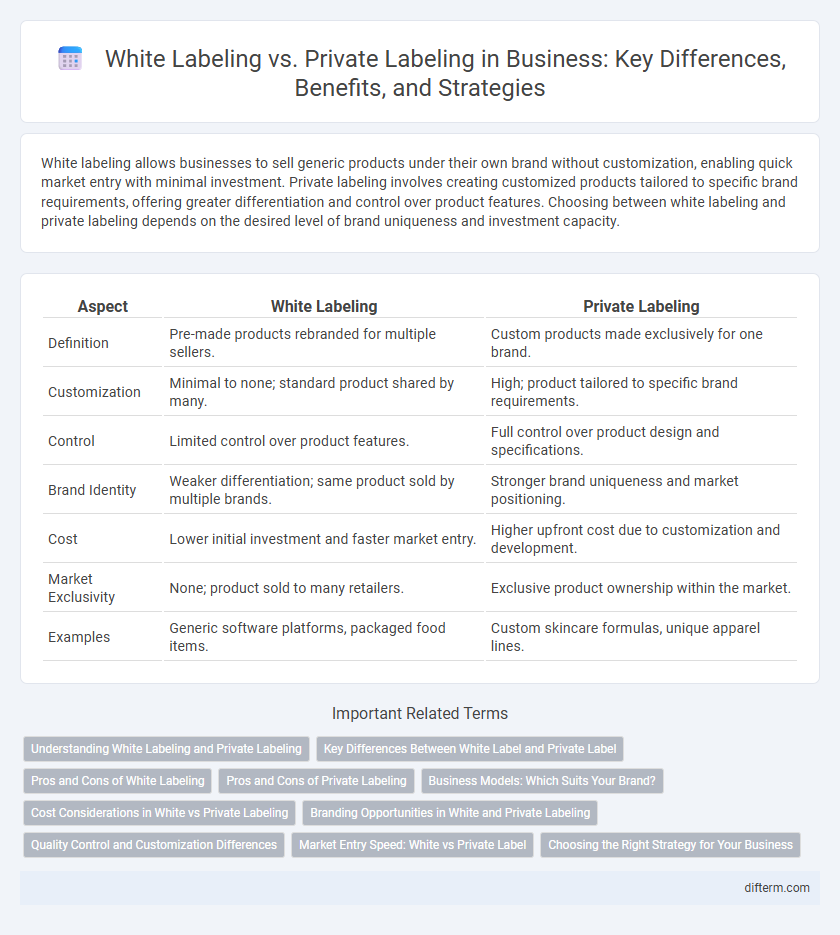White labeling allows businesses to sell generic products under their own brand without customization, enabling quick market entry with minimal investment. Private labeling involves creating customized products tailored to specific brand requirements, offering greater differentiation and control over product features. Choosing between white labeling and private labeling depends on the desired level of brand uniqueness and investment capacity.
Table of Comparison
| Aspect | White Labeling | Private Labeling |
|---|---|---|
| Definition | Pre-made products rebranded for multiple sellers. | Custom products made exclusively for one brand. |
| Customization | Minimal to none; standard product shared by many. | High; product tailored to specific brand requirements. |
| Control | Limited control over product features. | Full control over product design and specifications. |
| Brand Identity | Weaker differentiation; same product sold by multiple brands. | Stronger brand uniqueness and market positioning. |
| Cost | Lower initial investment and faster market entry. | Higher upfront cost due to customization and development. |
| Market Exclusivity | None; product sold to many retailers. | Exclusive product ownership within the market. |
| Examples | Generic software platforms, packaged food items. | Custom skincare formulas, unique apparel lines. |
Understanding White Labeling and Private Labeling
White labeling involves a manufacturer producing generic products that multiple businesses can rebrand and sell under their own names, streamlining product development and reducing costs. Private labeling refers to a retailer contracting a manufacturer to create products exclusively for their brand, offering unique customization and control over product specifications. Both strategies enable businesses to expand product offerings without investing heavily in manufacturing infrastructure.
Key Differences Between White Label and Private Label
White labeling involves selling generic products under multiple brand names, allowing businesses to rebrand ready-made items without altering the product itself. Private labeling enables companies to customize products exclusively for their brand, offering unique formulations, designs, or packaging tailored to their target market. The key difference lies in ownership and customization, with private labeling providing greater control and differentiation compared to the standardized approach of white labeling.
Pros and Cons of White Labeling
White labeling offers businesses the advantage of quickly entering the market with pre-made products branded under their name, reducing development costs and time. It allows companies to leverage established manufacturing expertise but limits customization options, which can affect differentiation and brand identity. However, dependence on the white label provider for product quality and supply chain reliability poses risks that can impact customer satisfaction and long-term growth.
Pros and Cons of Private Labeling
Private labeling offers businesses the advantage of exclusive branding, enabling stronger customer loyalty and higher profit margins compared to generic products. However, it requires significant upfront investment in product development, quality control, and marketing to establish a distinct market presence. Risks include dependence on manufacturer reliability and reduced flexibility in product customization due to existing production constraints.
Business Models: Which Suits Your Brand?
White labeling involves purchasing generic products from a manufacturer and branding them as your own, allowing for faster market entry with lower development costs. Private labeling permits greater customization and control over product specifications, enhancing brand uniqueness and customer loyalty. Choosing the right business model depends on your brand's long-term goals, budget, and desired level of product differentiation.
Cost Considerations in White vs Private Labeling
White labeling typically involves lower upfront costs as products are pre-manufactured and simply rebranded, reducing expenses in product development and manufacturing. Private labeling requires higher initial investment due to customization, including unique formulations, designs, and packaging, which can increase production costs significantly. Businesses must weigh these cost differences against potential brand control and market differentiation when choosing between white and private labeling.
Branding Opportunities in White and Private Labeling
White labeling allows businesses to sell generic products under their own brand, providing extensive branding opportunities without the need for product development. Private labeling involves customizing products specifically for the brand, enabling stronger differentiation and exclusive brand identity. Both strategies enhance brand recognition but private labeling offers greater control over product specifications and brand positioning.
Quality Control and Customization Differences
White labeling offers limited quality control since products are pre-designed by manufacturers, whereas private labeling allows businesses to oversee production processes to ensure higher quality standards. Customization in white labeling is minimal, often restricting brand-specific modifications, while private labeling provides extensive customization options including packaging, formulation, and design. These differences significantly impact product differentiation and brand identity in competitive markets.
Market Entry Speed: White vs Private Label
White labeling enables faster market entry due to ready-made products that only require branding changes, significantly reducing production and development time. Private labeling often involves custom product development, which extends lead times but offers more control over product specifications. Businesses prioritizing rapid launch typically prefer white labeling, while those seeking unique brand differentiation may accept slower market entry through private labeling.
Choosing the Right Strategy for Your Business
White labeling allows businesses to rebrand existing products from manufacturers, offering faster market entry and lower development costs, while private labeling provides greater control over product specifications and brand uniqueness. Selecting the right strategy depends on factors such as budget, desired product differentiation, and long-term brand vision. Businesses aiming for rapid scalability might prefer white labeling, whereas those focusing on exclusive products and brand identity benefit more from private labeling.
white labeling vs private labeling Infographic

 difterm.com
difterm.com